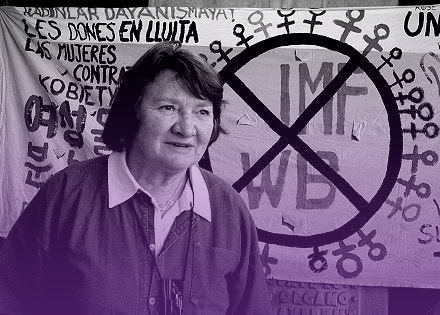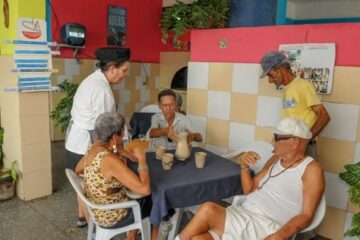“Only connect.” This sums up the political perspective of ecofeminism, as Ariel Salleh writes in the foreword of the book Ecofeminism, by Maria Mies and Vandana Shiva. The article below pays tribute to the memory of Maria Mies, who passed away on May 16th, and who for so many years has been an inspiration as an intellectual and militant for so many of us, grassroots feminists waging ecological struggles.
Maria Mies was a German sociologist who greatly contributed to feminism, especially ecofeminism, with her formulations about development, the dynamics of accumulation, globalization, and ecological crisis. She especially looked into the patriarchal and colonial oppression of women from the global South, and she was an important interlocutor with thinkers including Vandana Shiva and Silvia Federici. Salleh argues that “ecological feminists are both street-fighters and philosophers.” Mies was one of them, as many of us are.
Only connect. No other political perspective—liberalism, socialism, feminism, environmentalism—can integrate what ecofeminism does: why the Roma people are still treated like animals; why women do 65 per cent of the world’s work for 10 per cent of its wages; why internet images of sexually abused children generate millions of dollars; why chickens are bred only for livers and wings; or why the Earth itself is manipulated as a weapon of war. Species loss is endemic; peak water is on the way; soils are losing organic integrity; the atmosphere is riven by angry storms.
Ariel Salleh
“Only connect” is a political perspective that Maria Mies adopted to the nth degree. By doing so, she revealed to us the profound connections between patriarchy, capitalism, and colonialism, building a radical theory for the liberation of women and the peoples.
In line with other ecological feminists, she reminds us in her book Patriarchy and Accumulation on a World Scale—recently translated into Portuguese by the Sycorax collective and published by Ema Livros—that the paradigm of never-ending growth and progress is a patriarchal myth. It is a paradigm that cannot become true, both because we live in a materially finite world and because the condition for the progress of certain societies, under capitalism, is the exploitation of others.
In this sense, Mies also challenges what we would now call “techno-solutionism,” challenging the idea that, under a socialist society, technological development would ensure the expansion of workers’ free time. Her key argument is the fact that the development of technology has historically relied on the exploitation of the territories and the peoples of the global South, through mega power and mining projects, for example.
In her perspective, expanding women’s free time is an important topic that has to be considered in tandem with the transformation of the sexual division of labor. She argues that these two transformations could not be ensured by technology, but rather by establishing a political stance of appreciating the labor that reproduces life and challenges the division between leisure and socially necessary labor. This is especially important for freeing women’s time and labor, because most labor carried out by women is not alienated labor: they produce life and use value, including care and agriculture for own consumption. So the issue is not about reducing as much as possible the existence of this labor by replacing it with technology, but rather appreciating it, placing it at the center of the economy, and building work relationships that are interwoven with rest and pleasure.
Maria Mies has also opened the way with her formulations about the division between productive and reproductive labor. She rejected the way this division is usually understood, in which the labor that generates surplus value—and often the exploitation of nature with the exploitation of labor—is rendered productive, while the labor that generate the reproduction of life is deemed “reproductive.” She daringly suggests that productive labor is labor that generates life and use value, important for most people, including education, care, and food—while labor that only generates surplus value and destruction, like the death industries (weapons, agrochemicals, relentless mining exploitation) is “destructive” labor and should cease to exist.
To make this happen, Maria Mies reminds us that the countries in the global South must necessarily build their sovereignty with more self-sufficient economies. By challenging the international division of labor, she proposed a more decentralized production and consumption model, which would reduce the alienation of labor and lead to a positive ecological impact.
By providing harsh, well-formulated criticism and designing propositions for a horizon of emancipation, Maria Mies fed our feminist imagination. This imagination is ever more necessary so that we do not adopt a cynical, defeated stance in face of the sheer amount of connected crises we are facing. “Only connect” is an imperative to find ways to destroy the systems of domination—all at once.

Natália Lobo is an agroecologist, a World March of Women militant, and a member of the SOF—Sempreviva Feminist Organization (SOF Sempreviva Organização Feminista) team.




